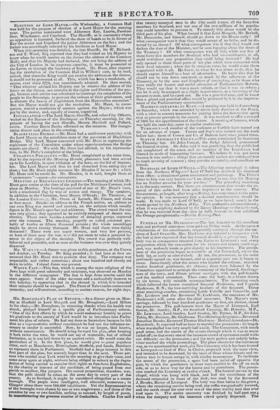Mn. BROUGHAM'S PLAN or REFORM—At a dinner given on Mon-
day at Sheffield to Lord Morpeth and Mr. Brougham,—Lord Milton in the chair,—Mr. Brougham, in returning thanks when his health was drunk, pledged himself to a specific plan of Parliamentary reform. "One of the first efforts by which he would endeavour humbly to prove his gratitude to the county of York would be to introduce into Parlia- ment his plan of reform. He had not done so heretofore because he felt that as a representative without constituents he had not the influence ne- cessary to render it successful. Now, he was no longer, God knows, without constituents. He should bring forward his plan' after keeping it back twice the time, lie would not say of statutable, but of critical limitation, as it was laid down by an ancient critic. He would state the particulars of it. In the first place, he would give to great populous cities, such as Manchester, Birmingham, Sheffield, and Leeds, Members to represent them in Parliament. Sheffield had a large interest in this first part of the plan, but scarcely larger than in the next. Those per- sons who resided near York went in the morning to give their votes, and came away again at night, without being obliged to submit to the degra- dation of being carried to exercise tlieir rights as free-born Englishmen, by the charity or interest of the candidate, of being passed from one parish to another, like paupers. His second proposition, therefore was, that the polls should be taken on the same day in every part of the county. As to Scotland, it might be considered altogether as a rotten borough. The people were intelligent, well educated, numerous ; in Glasgow alone there were 100,000 inhabitants. Yet the Representatives of the boroughs were chosen by one or two magistrates ; and those of the counties by one or two families, seeking to succeed, by length of purse, in manufacturing the greatest number of freeholders. Charles Fox said that twenty moneyed men in the City could renun all the forty-five members for Scotland, and not one of the two millions of its popula- tion could interfere to prevent it. To remedy this abuse would be the third part of his plan. What booted it that fiord Morpeth, Mr. Beaten, Mr. Duncombe, and himself, should go down to the House early ? Of what consequence was it that they would accepeof no bribe,. and be de- terred by no threat ? Of what consequence was it that they would not darken the door of the Minister, nor be seen hanging about the doors of the Treasury ? Of what consequence was all this, while any five of those forty-five members for Scotland, who had no constituents at all, could overthrow any proposition they could bring forward ? lie had only opened to them those parts of his plan which were connected with their local interests ; when the fit occasion came, he would make them acquainted with it all. He knew, in what he was about to do, that he should expose himself to a host of adversaries. He knew also that he should not be run down one-tenth so much by the adherents of the Treasury, or by the sons and daughters of corruption, as by those who were really the honest and useful advocates of Parliamentary Reform. They would say that it was a mock reform, or that it was no reform ; but let it only be accepted as a slight improvement, as a bettering of the present system, and he cared not. He was a practical man, and he knew that a grand and practical effect would be produced by it in the improve- ment of the Parliamentary constitution." IlacinNE-ettEaxErts IX KENT.—A meeting was held in Canterbury on Saturday, which was attended by above forty Justices of the Peace, with a view to concert measures for putting down the destructive spirit that at present prevails in the county, it was resolved to offer a reward of 500/. for the apprehension of the rioters. A meeting of farmers, which was held the same day, came to similar resolutions. TURN-OUT.---A number of the workmen at Carlisle have turned out for an advance of wages. Cowen and S011'S men turned out the week before last ; those of Cowen and Co. of Dalston have since joined them.
SCOTCH ADMIRALTY COURT.—This court terminated its functions on Thursday last. Sir John Connel, the Judge Admiral, pronounced the funeral oration. Sir John said it was gratifying that the public had not complained of the court, and no member of the Legislature had blamed its mode of transacting business. We believe it was put down because it was useless : things that are merely useless are seldom subject to much severity of censure ; they provoke no enmity, and conciliate no friends.
DIsurssat. or LORD O'NEILL.—The following paragraph is taken from the Northern Whig :—" Lord O'Neill has received his dismissal from office; a situation of great emolument and patronage. The Duke's letter to him was very laconic:—' I am directed to say, that his Majesty has no further occasion for your services. '' The preceding statement is in the main correct. But there are circumstances that render the re- moval of this noble lord from office important to the country. The Government, at length, after long suffering, has come round to the popu- lar opinion. It was necessary that a decided manifestation should be made. It was made to Lord O'Neill, as we have heard, nearly in the words quoted by the Northern Whig. This produced a correspondence ; when it was explicity declared by Sir Henry Hardinge to the noble cad, that he was removed from the 1.1fice he held, because he had exhibited the Orange paraphernalia.—Dablin Eteniny-Post.


























 Previous page
Previous page